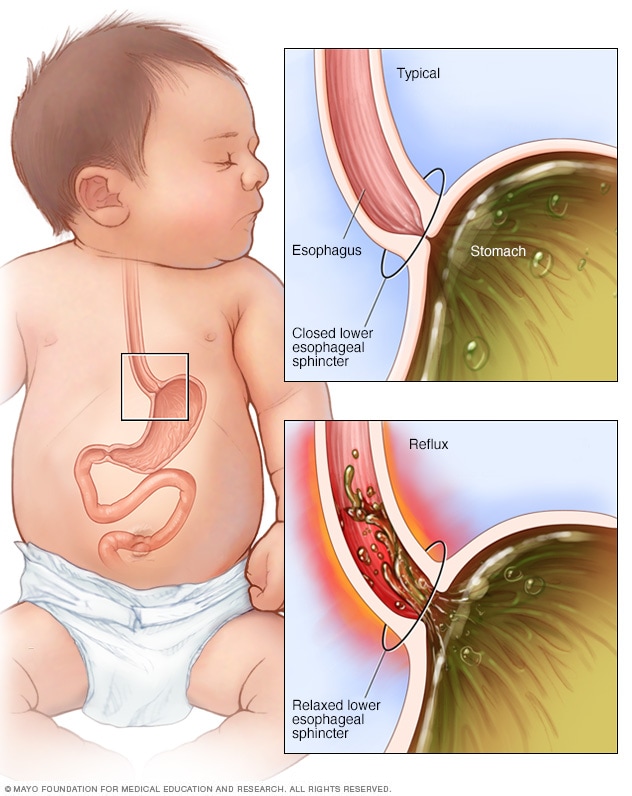Spitting up in babies: What’s OK, what’s not
Many babies spit up. Here’s what’s behind spitting up and when it might signal a more serious problem.
You’ve just fed your baby breast milk or formula only to watch the baby spit up what seems like all of it. Is spitting up OK? Find out more about spitting up and what you can do about it.
What causes spitting up?
Infant acid reflux

Infant acid reflux
If the muscle between the esophagus and the stomach relaxes when the stomach is full, food might flow up the baby’s esophagus. The muscle is called the lower esophageal sphincter.
Spitting up is common in babies. During their first three months, about half of all babies do it. The food backs up from the baby’s stomach through the same tube that carries food to the stomach, called the esophagus. This condition is called gastroesophageal reflux, infant reflux or infant acid reflux.
A muscle between the esophagus and the stomach keeps food in the stomach. The muscle is called the lower esophageal sphincter. Until this muscle has time to mature, your baby might spit up. This happens mainly when the baby’s stomach is full.
What is the difference between spitting up and vomiting?
It can be hard to tell the difference sometimes. Most often, spitting up is the easy flow of food from the baby’s stomach back through the mouth. The baby also might burp. Vomiting might happen with spit up, but it comes out with force. It shoots out of the mouth rather than oozing.
It seems like my baby is spitting up a lot. Can spitting up affect my baby’s growth?
Most often spitting up doesn’t affect a baby’s growth. Does your baby seem well? Is your baby eating and gaining weight? Then there’s little cause for worry.
Keep in mind that when you see how much your baby has spit up based on the size of a spit-up stain, it’s easy to think there’s more than there is. Babies most often spit up only one or two mouthfuls of breast milk or formula.
Will my baby outgrow spitting up?
Most babies stop spitting up by age 12 months.
What can I do to ease spitting up?
Try these tips:
- Keep your baby upright. Keep your baby’s head higher than the rest of the body for each feeding. Keep your baby upright for 30 minutes after each feeding. Don’t do active play or use an infant swing right after feeding.
- Don’t overfeed. Feed your baby smaller amounts more often.
- Burp your baby more. Burping during and after each feeding can keep air from building up in your baby’s stomach.
- Watch what you eat. If you’re breastfeeding, your baby’s healthcare professional might suggest not eating dairy or certain other foods.
- Keep tobacco smoke away from your baby. Tobacco smoke adds to gastrointestinal reflux in adults. Besides maybe making your baby’s spitting up worse, being around smoke is bad for the baby’s health in many ways.
Even if your baby spits up, put your baby to sleep on the back. This is to lower the risk of sudden infant death syndrome, also called SIDS. Don’t put your baby to sleep on the stomach to try to keep the baby from spitting up.
Can spitting up be a sign of a problem?
Certain symptoms might mean an underlying condition or something more serious than just spitting up. Contact your baby’s healthcare professional if your baby:
- Isn’t gaining weight.
- Spits up with force.
- Spits up green or yellow fluid.
- Spits up blood or what looks like coffee grounds.
- Refuses to feed.
- Has blood in the stool.
- Has trouble breathing or other signs of illness.
- Begins spitting up at age 6 months or older.
- Cries more than usual or is more cranky than usual.
- Has fewer wet diapers than usual.
Treatment depends on what’s causing your baby to spit up. There might be ways of feeding that can help. Sometimes, a healthcare professional might prescribe medicine to treat reflux.
Children’s health information and parenting tips to your inbox.
Sign-up to get Mayo Clinic’s trusted health content sent to your email. Receive a bonus guide on ways to manage your child’s health just for subscribing. Click here for an email preview.
To provide you with the most relevant and helpful information, and understand which information is beneficial, we may combine your email and website usage information with other information we have about you. If you are a Mayo Clinic patient, this could include protected health information. If we combine this information with your protected health information, we will treat all of that information as protected health information and will only use or disclose that information as set forth in our notice of privacy practices. You may opt-out of email communications at any time by clicking on the unsubscribe link in the e-mail.
Thank you for subscribing
Our e-newsletter will keep you up-to-date on the latest health information.
Something went wrong with your subscription.
Please try again in a couple of minutes
Jan. 14, 2025
Products and Services
.
